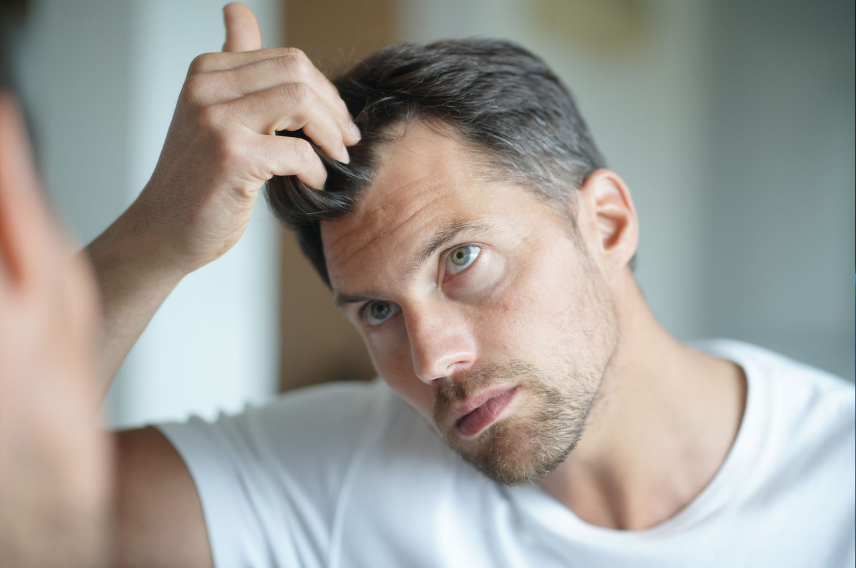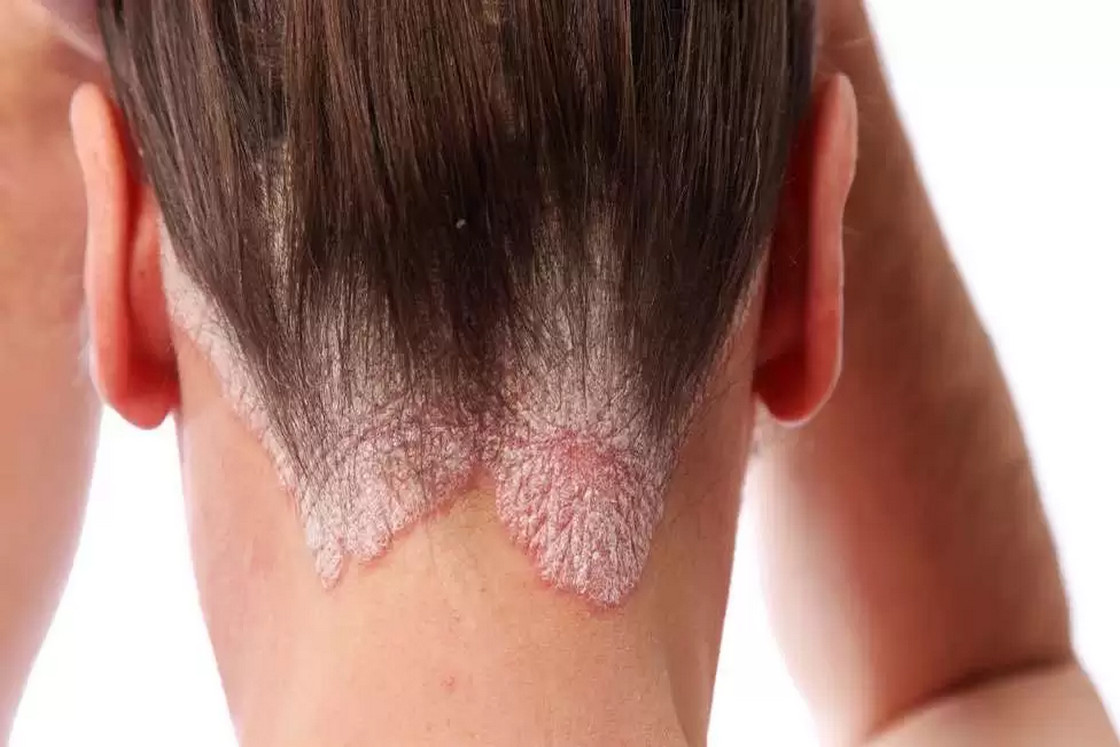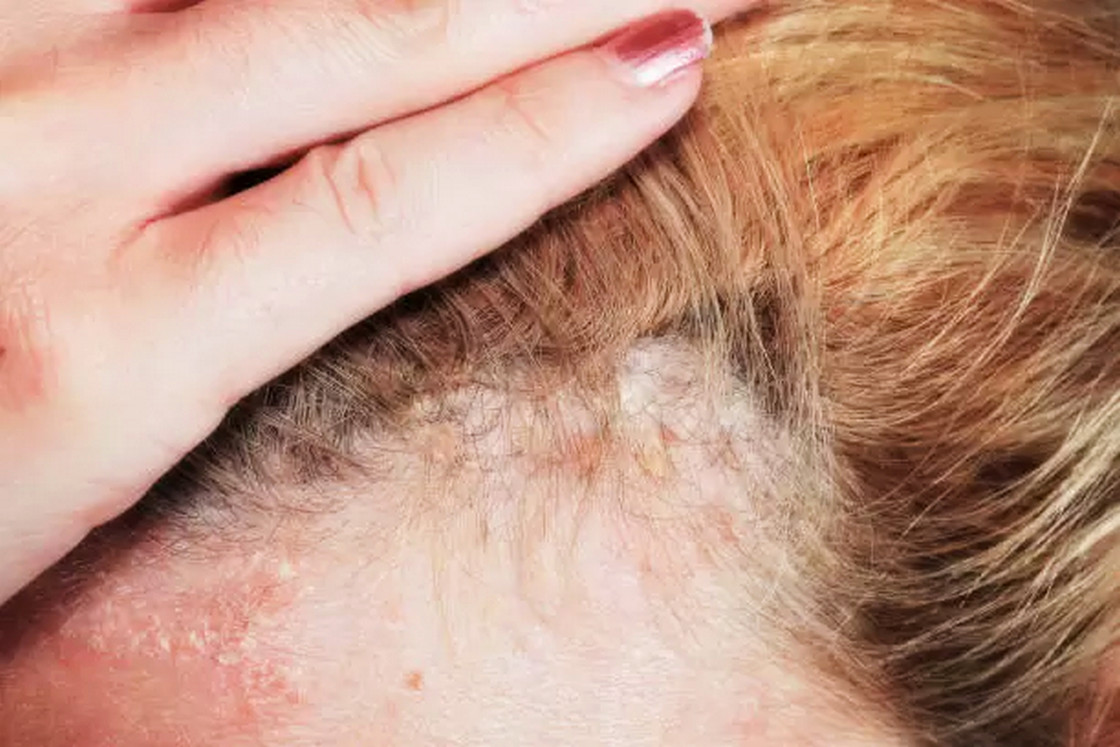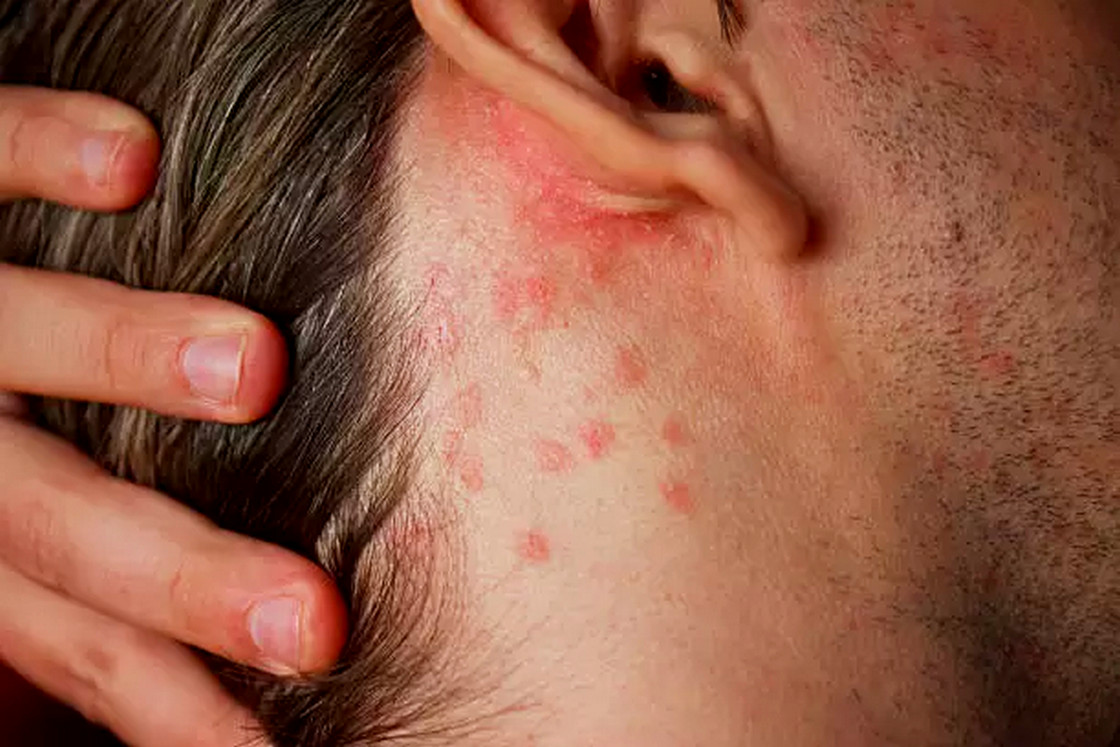
Join 900+ satisfied U.S. patients who chose Hairfix for natural-looking results.
From border pickup to hotel stay, we take care of every detail.
One of the most feared conditions is psoriasis, an autoimmune disease that affects the skin of any part of the body and scalp; It is characterized because the cells reproduce very quickly, producing peeling on the surface of the skin, forming outbreaks with the appearance of a red or whitish crust.
Psoriasis of the scalp is usually a precursor to other outbreaks that affect the joints, nails, mucous membranes and extremities. In the hair it usually appears as large plaques on the forehead, hairline, nape of the neck, and can even extend to the ear or eyebrows.
Symptoms: how does it manifest?
Psoriasis is often confused with dandruff, which is found throughout the scalp, causes itching and peeling of the skin and even affects the eyebrows. However, psoriasis forms delimited plaques, peeling, irritation, dryness, intense itching that, if not controlled and treated in time, can cause permanent hair loss, by damaging the follicle as a result of an infection that damages some follicles. permanent.
It is important that you go to the doctor if you have the following symptoms:
Patches of reddish skin
These patches will appear well defined, in and around the hair, and sometimes with a silver tone.
Scaly areas
These appear along with the patches. They can be of different shades depending on the color of the skin, generally gray in brown or black tones, and reddish in lighter skin.
Extra dry and cracked skin
The skin in and around the patches is too dry, cracked, and probably bloody.
Burning and itching
The burning that occurs does not compare to the level of itching and desire to scratch that you will experience, but it is necessary not to scratch to avoid bleeding, possible hair loss, as well as infections that can occur from touching the cracks. open.
Temporary hair loss
Hair loss in affected areas is usually temporary, but the risk of irreversible loss could be increased if the patient scratches because of the itch.
Causes
Psoriasis is a chronic, inflammatory disease that attacks the skin, scalp and immune system; It has a prevalence of 2.5 to 3% of the population, it is of genetic origin, since 1 in 3 patients has a family member with this condition. In addition to the genetic origin, an immunological origin is involved, that is, an imbalance in the body’s defense system, since it is the body’s own immune system that attacks healthy body tissue, causing the aforementioned symptoms.
Outbreaks usually occur as a result of a triggering factor that can be a skin burn, an infection in the respiratory tract, periods of stress, hormonal changes and even a traumatic event for the patient.

Risk factor’s
Genetics
It has a prevalence of 2.5 to 3% of the population, it is of genetic origin, since 1 in 3 patients has a family member with this condition.
Immune system
An imbalance in the body’s defense system, since it is the body’s own immune system that attacks healthy body tissue, causing the aforementioned symptoms.
Infections
Strep throat is the main infection that can trigger psoriasis.
Stress
Being under stressful circumstances can trigger psoriasis symptoms or increase them.
Medicine
The use of certain drugs is related to the appearance of capillary psoriasis, among which indomethacin and quinidine stand out.
Feeding
In research carried out in 2016 by nutritionists, they pointed out that inflammatory factors related to obesity and gluten sensitivity can trigger psoriasis.
Diagnosis
The dermatologist is the specialist indicated to diagnose and treat psoriasis. Usually only a physical examination and clinical history of the patient are required to assess risk factors, causes of the outbreak, and determine if it really is psoriasis or another condition.
In addition to the scalp, the specialist will probably explore the skin without clothing to rule out outbreaks in inconspicuous parts of the body such as the groin, folds of the buttocks or armpits, soles of the feet, among others.
Treatment
It is important to note that there is no treatment as such for capillary psoriasis. Additionally, medical experts from the National Psoriasis Foundation in the United States suggest a combination and rotation of treatments, thus preventing the body from getting used to it and the response decreasing after repeated use.

With topical medications
Topical treatment is the most common, which is usually based on hair products such as cream, shampoo, corticosteroids and the application of oil or Vaseline to moisten and soften the scales. Once the scales are gone, treatment focuses on reducing the lesions caused by psoriasis, with the use of antihistamines to relieve itching and burning.
Salicylic acid helps soften the flakes that are generated, the use of a shampoo that contains this component is suggested, but under observation in case reactions occur that irritate and weaken the hair.
Mineral tar derived from coal is a distillate that is recommended to reduce itching and inflammation, in addition to gradually restoring the appearance of the skin.
In convenience stores and on the internet you can find shampoos and creams that contain these ingredients, but medical approval is ideal before undergoing any treatment.
With systemic medications
Systemic medications enter directly into the bloodstream and affect all the cells in the body.
These medications are recommended when scalp psoriasis is at moderate to severe levels. They are administered orally or injected, and must be prescribed by the specialist doctor.
The most common ones used are:
- cyclosporine
- oral retinoids
- methotrexate
With steroids
To a lesser extent, capillary psoriasis can also be treated with steroids that will help reduce itching and inflammation. You should talk to your doctor first about this option before starting it, as there may be side effects.
Other treatments
It is believed that phototherapy can help with treatment, exposing the scalp to ultraviolet light on a regular basis.
There is also talk of natural remedies with ingredients such as apple cider vinegar, aloe vera, oats, turmeric, among others.
Forecasts
Being a chronic condition, psoriasis has no cure: it is important to know that it can subside for a time and reappear due to a triggering factor, so diagnosis is essential to determine the reasons why psoriasis appears and try to treat it. avoid them; In some patients, this condition appears due to stress, inadequate diet, hormonal changes, smoking, alcohol consumption, among other causes.
Therefore, the patient who takes care of his diet, maintains a healthy life, controls stress and follows prevention recommendations will be able to recover from the outbreaks and prevent them from reappearing or making them milder.
Tips to cope with hair psoriasis
If you start to suffer from this annoying condition, we recommend that you do the following:
- The main thing we can advise you is not to scratch the affected area or areas. Despite the itching that may occur, scratching can cause significant skin lesions.
- Go to a specialist doctor who will give you a complete overview of the condition and prescribe the most appropriate treatment for your case, depending on its severity.
- Treat your hair gently, when bathing use warm water and when combing, do so carefully so as not to remove the scales with the comb.
- Avoid using dyes or products that may contain fat.
- Dry all your hair well, the area behind the ears and the neck. Do not use a hair dryer directly.
- Use moisturizers that can give freshness and improve the appearance of dry skin.
- Detect and avoid the factors that trigger scalp psoriasis in your body.
Frequent questions
What foods are serious for psoriasis?
Foods that stress the body are related to psoriasis outbreaks, so it is important to reduce or avoid their intake; some are:
- Red and processed meats. Sausage, ham, bacon, among other foods, are rich in Omega 6 which, when consumed in excess, increases the formation of arachidonic acid that causes inflammation in the skin.
- Dairy products. Cheese, yogurt, among other dairy products, also cause the formation of arachidonic acid, so it is recommended to replace them with drinks of plant origin, such as coconut or almond milk.
- Ultra processed foods. Excess sugar, salt and fat cause lesions to increase, as they cause tissue inflammation. In addition, overweight and obesity are associated with psoriasis and, by losing weight, the symptoms of the disease usually improve.
- Gluten. People who abandon gluten obtain improvements in their skin, since flours also cause inflammation in the skin.
- Alcohol and cigarette. They are products that alter the immune system, so outbreaks can be more annoying and frequent when consumed.
Patients are recommended to consume foods rich in Omega 3 such as salmon, trout, sardines, flaxseed, chia, vegetables, fruits, among others to combat the inflammation that occurs in psoriasis.

It is contagious?
Being a condition of autoimmune origin, psoriasis is not contagious: it usually has cycles with outbreaks that last a couple of weeks or several months, and subsequently decrease or go into remission. However, it is recommended not to share personal hygiene products since the person with psoriasis requires daily care, with special cosmetics that are gentle on their skin.
Can I pass it on to my children?
If you suffer from psoriasis, your children have a certain predisposition to suffer from it since, as we mentioned previously, 1 in 3 patients has a family member with this condition. However, as such, it is not a contagious or hereditary disease.
What shampoo is good for psoriasis on the scalp?
Topical treatment to eliminate psoriasis scales is usually based on salicylic acid, urea, benzoyl peroxide, and tar derivatives, which should be applied only to the affected areas of the scalp. After a while, the scales come off easily with a soft comb, but it is important not to pick off the ones that are still attached to the skin, as scratching can aggravate the psoriasis, lead to an infection or a new outbreak.
Furthermore, by removing scales that are still attached, the hair present in the area can break; Although it will grow back over time, this can cause bald spots that will make the damage of psoriasis more visible.
Sometimes, after the scales have been removed and the outbreak has passed, it is recommended to use a tar shampoo twice a week, leaving the product in contact with the scalp for about five minutes to reduce the possibility of new outbreaks. In general, psoriasis treatment products dry out the hair, so the use of conditioners and, sometimes, a corticosteroid spray or antihistamine products is recommended if there is redness, itching or discomfort.
Can it cause hair loss?
Psoriasis can affect the scalp, causing the hair to weaken, fall out and, although it usually grows back, it causes a lot of stress and worry in people who suffer from it.
There are three types of alopecia related to psoriasis:
- Alopecia in areas with psoriatic wounds. Some patients have a decrease in hair density in the affected area, since studies have found that most of the hair found in areas with psoriasis wounds is in the telogen, or shedding, phase.
- Reversible generalized alopecia. Psoriasis can cause telogen effluvium, a phase in which more hair falls out, so the patient can lose a lot of hair, but the good news is that it is not a permanent loss.
- Cicatricial alopecia. It is the less common form, which occurs because psoriatic scalp wounds take a long time to heal, and in some studies it has been found that this condition is caused by a staphylococcus infection.
Is a haircut necessary if I have psoriasis?
Many people with psoriasis prefer to wear their hair short to facilitate the application of treatments, avoid the use of very strong products (such as dyes) and hide the hair loss they suffered, however a cut is not necessary since this factor does not influence in the evolution of the disease.
A general recommendation is the use of air hair dryers, which help remove the scales without touching or scratching them, which is not recommended due to the risk of infecting the skin and aggravating the outbreak.
Can I use hair products if I have psoriasis?
Yes, hygiene is very important for people who suffer from psoriasis, since their skin must be moisturized and protected from the sun. However, it is recommended to use shampoo, gel, sponges or scrubbers, razors, among other aggressive products, and the dermatologist should be the one to indicate the recommended brands for daily use.
Some people with psoriasis cannot tolerate the use of dyes or perms on their scalp, so they prefer not to use them; And, regarding fixatives, spray and gel, it is best to use alcohol-free products.
Sunscreen and photoprotective makeup are recommended to protect the skin from the effects of solar radiation, and showers with warm to cold water and the use of hats or umbrellas to protect yourself from the sun are also usually recommended.
At Hairfix we are experts in hair transplantation in Mexico and we can help you if you suffer from androgenic alopecia or alopecia in women or other types. Contact us for more information about the affordable hair restoration or to schedule your appointment by WhatsApp at (554) 502 7527, call us at (558) 789 4406 or write to us at info@hairfixmexico.com. We will gladly assist you!


